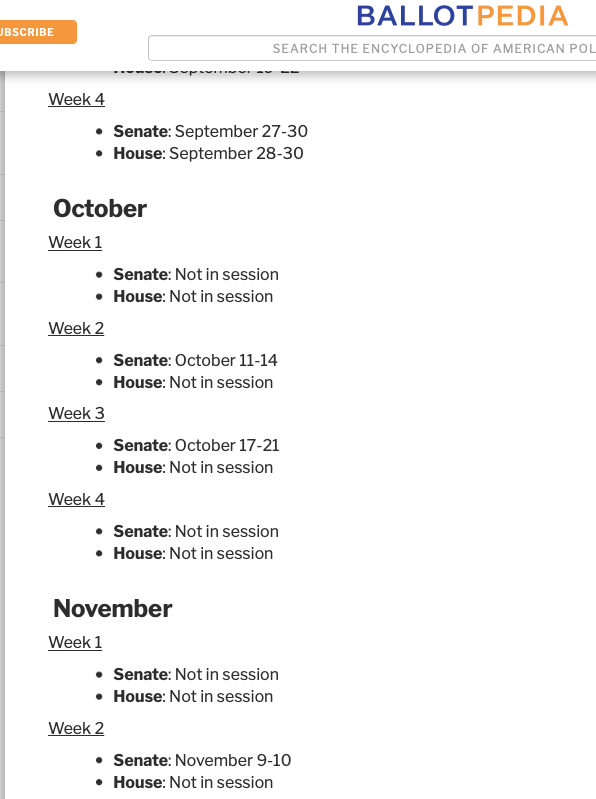Ballotpedia shows us that the House of Representatives in Washington D.C. is not in session at all in October:
They will not meet at all during this month, nor in the first week of November. This doesn’t mean that congressional representatives will not work during the month of October. But they will not be in Washington and they will not vote on legislation.
What happened?
We heard that Congress would vote on HR8393 in September. The bill was passed by the House Natural Resources Committee with votes along party lines, except for Jenniffer Gonzalez-Colon, a Republican who sided with the Democrats on this issue.
“The committee has not considered many of the provisions and effects of the legislation,” wrote the Republicans on the committee, “including whether the provisions that may bind a future foreign government are valid or enforceable, the costs of the bill, how the legislation will impact U.S. national security, influences on U.S. elections, questions surrounding federal funds being transferred to a new foreign nation, and what effect this may have on Puerto Rico’s debt crisis, to name a few.”
There are currently 48 cosponsors for HR8393, including 9 Republicans. It seemed quite possible that the bill would be passed in the House and then could go on to the Senate to be considered. If this had happened, Puerto Rico could have resolved the status question and ended the colonial relationship within the next few years.
Hurricane Fiona brought urgent needs to Puerto Rico on top of the continuing need for repair and reconstruction after Hurricane Maria. Congress did not have the opportunity to consider HR 8393.
Postponed, not cancelled
But there is not the same reaction as there was after Hurricane Maria; we are not hearing that status can wait. NPR interviewer Steve Inskeep told Rep. Jenniffer Gonzalez-Colon that he was hearing statehood advanced as the solution to hurricane damage.
“[There] definitely is a direct connection, and the reason for that is that Puerto Rico, as a territory of the United States, needs to comply with a lot of federal laws. But we do not receive the same resources as a state. And I will give you just one example. Health care, Medicaid, Medicare, Social Security income – those are programs that apply completely different to Puerto Rico. And because we don’t have enough local resources to match those federal programs, we cannot access some of them. And those are just a few examples. We can tell you about more than 47 federal laws that treat Puerto Rico differently. And that means that this economic situation on the island, where you have a 47% of poverty rate – it’s higher than any other state,” Gonzalez-Colon responded. “Once Puerto Rico become a state, that will allow the island to normalize our economy, like it happened with Hawaii and with Alaska many, many years ago. And I think this is the right thing to do. I mean, I am certainly sure that Puerto Rico is going to become a state. The question is, how long is it going to take for the island to achieve that equality and be treated as first-class American citizens?”
The resident commissioner went on to say, “It’s expected to be in the floor of the House at the end of this year, and you will have Republican votes. So it’s a bipartisan bill. And I really expect, and the people of Puerto Rico are expecting, to have that bill approved.”
Now what?
If you live in a state, your congressional representatives will be back at home, consulting with their constituents. This is an opportunity to contact them and even to visit them in person.
Here’s how:
- Find your congressperson.
- Contact your congressperson by email or with a phone call. Ask for an appointment to meet with them. You might need to fill out a form or send a letter with your request. You might have to call more than once. Don’t be discouraged!
- If you can’t get an appointment with your legislator, you might be able to talk with a member of the staff. This is another way to make sure your representative is aware of the issues.
- You’ll have about 15 minutes with your congressperson, so you need to stay on track with your conversation. Check our Issues page to find links to fact sheets that can help. Your representative wants to hear your story and any effects Puerto Rico’s status has in your state and district, as well as the basic facts. Think about printing out a page to leave in your representative’s office.
- Ask your rep to vote in favor of HR8393.
- Leave your contact information.
After your visit your rep, let your friends and family know how it went and encourage them to do the same.








No responses yet